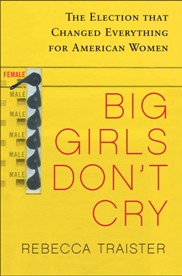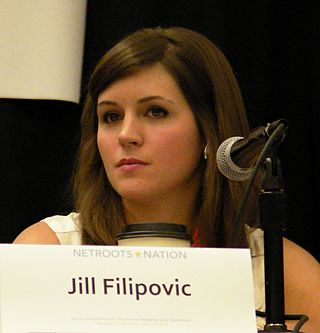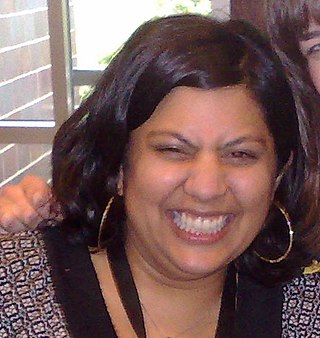
Christina Marie Hoff Sommers is an American author and philosopher. Specializing in ethics, she is a resident scholar at the American Enterprise Institute. Sommers is known for her critique of contemporary feminism. Her work includes the books Who Stole Feminism? (1994) and The War Against Boys (2000). She also hosts a video blog called The Factual Feminist.
The Independent Women's Forum (IWF) is an American conservative, non-profit organization focused on economic policy issues of concern to women. IWF was founded by activist Rosalie Silberman to promote a "conservative alternative to feminist tenets" following the controversial Supreme Court nomination of Clarence Thomas in 1992. IWF's sister organization is the Independent Women's Voice (IWV), a 501(c)(4) organization.

Catherine Alicia Young is a Russian-American journalist. Young is primarily known for her writing about feminism and other cultural issues, as well as about Russia and the former Soviet Union. She is the author of two books, a frequent contributor to the American libertarian monthly Reason, and a regular columnist for Newsday. In 2022, she joined The Bulwark as a staff writer. She describes her political views as "libertarian/conservative".

Michelle Goldberg is an American journalist and author, and an op-ed columnist for The New York Times. She has been a senior correspondent for The American Prospect, a columnist for The Daily Beast and Slate, and a senior writer for The Nation. Her books are Kingdom Coming: The Rise of Christian Nationalism (2006); The Means of Reproduction: Sex, Power, and the Future of the World (2009); and The Goddess Pose: The Audacious Life of Indra Devi, the Woman Who Helped Bring Yoga to the West (2015).

Jessica Valenti is an American feminist writer. She was the co-founder of the blog Feministing, which she wrote for from 2004 to 2011. Valenti is the author of six books: Full Frontal Feminism (2007), He's a Stud, She's a Slut (2008), The Purity Myth (2009), Why Have Kids? (2012), Sex Object: A Memoir (2016), and Abortion: Our Bodies, Their Lies, and the Truths We Use to Win (2024). She also co-edited the books Yes Means Yes: Visions of Female Sexual Power and A World Without Rape (2008), Believe Me: How Trusting Women Can Change the World (2020). Between 2014 and 2018, Valenti was a columnist for The Guardian. She currently runs the Abortion, Every Day newsletter on Substack. The Washington Post described her as "one of the most successful and visible feminists of her generation".

Yes Means Yes: Visions of Female Sexual Power and a World Without Rape is a feminist non-fiction book edited by Jaclyn Friedman and Jessica Valenti, published in 2008. The book was one of Publishers Weekly's 99 Best Books of 2009 and inspired a sexual education non-credit course at Colgate University. The title refers to the popular, "Yes Means Yes" affirmative consent campaign against date rape, which calls for sexual participants to obtain a declaration of consent, "yes", to each sexual act or escalation.

Jaclyn Friedman is an American feminist writer and activist known as the co-editor of Yes Means Yes: Visions of Sexual Power and a World Without Rape and Believe Me: How Trusting Women Can Change the World, the writer of Unscrewed: Women, Sex, Power and How to Stop Letting the System Screw Us All and What You Really Really Want: The Smart Girl’s Shame-Free Guide To Sex and Safety, the founder and Executive Director of EducateUS, an organization focused on building a movement of voters laser-focused on advancing sex education across the country. She is also a campus speaker on issues of feminism, sexual freedom and anti-rape activism, and the founder and former executive director of Women, Action & The Media.
The F-Word is a UK-based feminist website founded by Catherine Redfern in 2001, initially as a forum for young feminists. The F-Word has since turned into a contemporary feminist website containing features, blog pieces and reviews on hot-topic feminist issues.
A feminist blog presents the issues of feminism through a blog. These websites emerged in the late 1990s and early 2000s, and focus on issues such as gender equality, women's rights, and social justice, among other topics related to feminism. These platforms offer unique perspectives and insights, providing a voice for feminist discourse and activism in the digital age.
Julie Zeilinger is an American author and writer. Her books include A Little F'd Up: Why Feminism is Not a Dirty Word (2012) and she founded the feminist blog The FBomb in 2009, which partnered with the Women's Media Center in 2014 to become the online platform WMC FBomb.
Networked feminism is a phenomenon that can be described as the online mobilization and coordination of feminists in response to sexist, misogynistic, racist, and other discriminatory acts against minority groups. This phenomenon covers all possible definitions of what feminist movements may entail, as there have been multiple waves of feminist movements and there is no central authority to control what the term "feminism" claims to be. While one may hold a different opinion from another on the definition of "feminism", all those who believe in these movements and ideologies share the same goal of dismantling the current patriarchal social structure, where men hold primary power and higher social privileges above all others.
Women Against Feminism is an informal movement of women sharing equal ideals with antifeminists in rejecting feminism. Using #WomenAgainstFeminism, the hashtag is normally accompanied by a "selfie" style photo, holding up handwritten posters stating reasons why they disapprove of modern feminism. Most of the posts begin with the statement, "I don't need feminism because", followed by their reason(s).

Big Girls Don't Cry: The Election that Changed Everything for American Women is a 2010 non-fiction book written by the American journalist Rebecca Traister and published by Free Press. The book focuses on women's contributions to and experiences of the 2008 United States presidential election. Traister places particular focus on four main political figures—Hillary Clinton, Sarah Palin, Michelle Obama, and Elizabeth Edwards—as well as women in the media, including the journalists Katie Couric and Rachel Maddow, and the comedians Tina Fey and Amy Poehler, who portrayed Sarah Palin and Hillary Clinton on Saturday Night Live, respectively. Traister also describes her personal experience of the electoral campaign and her shift from supporting John Edwards to Hillary Clinton.

Courtney E. Martin is an American feminist, author, speaker, and social and political activist. She is known for writing books, speaking at universities throughout the nation, and for co-editing the feminist blog, Feministing.com. Her work also appears on numerous other blogs and websites. She is also a recipient of the Elie Wiesel Prize in Ethics. She is known for promoting feminism by integrating storytelling and solutions into her writings and talks. According to Parker Palmer, she is “one of our most insightful culture critics and one of our finest young writers.” In 2013 she helped found the Solutions Journalism Network with journalists David Bornstein and Tina Rosenberg.

Jill Nicole Filipovic is an American author and attorney.
Technofeminism is a theoretical and practical framework that explores the intersections between technology, gender, and power. Rooted in feminist thought, it critically examines how technology shapes, reinforces, or disrupts gender inequalities and seeks to envision more equitable futures through technological design and use.

Nona Willis Aronowitz is a New York-based writer and editor, whose work focuses on "women, sex, politics, and the economy". She was the sex and love advice columnist for Teen Vogue from 2019 to 2023. She is the author of Bad Sex, a 2022 memoir published by Plume-Penguin Random House, and served as an award-winning editor of collections of her mother's works. Aronowitz has worked for NBC, NPR, and other news venues, and her writings have appeared in The New York Times, the Washington Post, New York Magazine, The Guardian, and other venues.

Samhita Mukhopadhyay is an American writer and former executive editor of Teen Vogue. She writes about feminism, culture, race, politics, and dating. She is the author of Outdated: Why Dating is Ruining Your Love Life and the co-editor of the anthology, Nasty Women: Feminism, Resistance, and Revolution in Trump's America.
Maya Dusenbery is an American journalist and author. She is the executive editor for editorial at feminist blog Feministing and the author of the book Doing Harm: The Truth About How Bad Medicine and Lazy Science Leave Women Dismissed, Misdiagnosed, and Sick.

American singer-songwriter Madonna is seen by some as a feminist icon. Throughout best part of her career, Madonna's forays into feminism, womanhood and media representation of women have sparked discussions among numerous feminist scholars and commentators worldwide. She has also been noted for her advocacy of women's rights.













